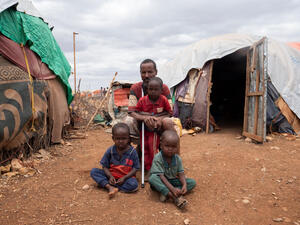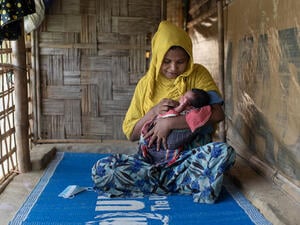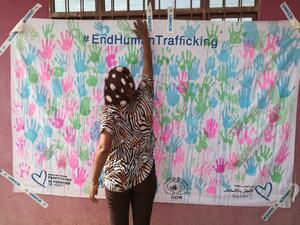News comment: Statement on refugee registration and data collection in Bangladesh
News comment: Statement on refugee registration and data collection in Bangladesh

A Rohingya refugee from Myanmar is registered by a UNHCR staff member at a refugee site in northern Aceh province, Indonesia.
Registering refugees is critical to ensuring they each have access to the assistance and protection they need. It allows for the early identification of those with specific needs or vulnerabilities and their referral to the appropriate services and support. Registration also helps keep families together or reunite them if they have been separated. This is particularly crucial when dealing with large numbers of displaced people, as is the case in Bangladesh, which is generously hosting some 880,000 Rohingya refugees.
UNHCR, the UN Refugee Agency, has clear policies in place to ensure the safeguarding of the data we collect when registering refugees all over the world.
When UNHCR and the Government of Bangladesh signed their Memorandum of Understanding on data sharing in January 2018, and organized their joint registration exercise of Rohingya refugees, specific measures were taken to mitigate potential risks.
These include measures to protect the personal data processed against accidental or unauthorized destruction, accidental loss, unauthorized access, use, alteration, or dissemination, and against all other unauthorized forms of processing.
During the registration of Rohingya refugees in Bangladesh conducted jointly by UNHCR and the Government of Bangladesh, each refugee family was informed of the purpose of the joint registration, which was primarily aimed at providing protection, documentation, and assistance to Rohingya refugees. All were asked to consent to their data being shared with partners on the ground for the purpose of receiving assistance.
In addition, and separately, the exercise was used to establish Rohingya refugees’ former residence in Myanmar and right to return. For this purpose, refugees were separately and expressly asked whether they gave their consent to have their data shared with the Government of Myanmar by the Government of Bangladesh.
Throughout the registration exercise, individual counselling in their languages was carried out to ensure that the refugees fully understood the purpose of the exercise, and to assist them to make an informed decision, by responding to their questions and concerns. It was made clear to refugees that the two processes were not linked to each other, that refugees were free to refuse data-sharing and that those who refused would still access the same assistance and entitlements as all others. Each family’s consent was confirmed at least twice and consent signatures were only obtained following this double-confirmation.
Prior to the registration in Bangladesh, a widespread counselling and information campaign was also organized to explain the exercise and inform refugees that they would all be able to access the same services and entitlements, regardless of their consent to share their data with the Government of Myanmar.
The refugee families who did not consent to share their data with the Government of Myanmar were still registered and able to access the same services and entitlements.
UNHCR wishes to stress that any return to Myanmar must be based on the individual and voluntary choice of refugees, if and when they feel conditions are right for them to do so.
For repatriations to take place, a distinct procedure is needed to ensure that refugees are able to make an informed decision and that conditions on the ground are conducive to safe and sustainable return. It is worth noting that many refugees have expressed their aspiration to return. UNHCR will assist refugee returns if voluntary and when conditions are conducive to safe and sustainable return, which is not currently the case.
The Rohingya outside of Myanmar are stateless refugees. The 1951 Convention relating to the Status of Refugees and its 1967 Protocol guarantees the right of a stateless refugee to return to his/her former habitual residence. The right to return to Myanmar is therefore considered inherent to their identity as Rohingya and does not expire as time passes. It is, however, up to the refugees to determine when they decide to return to Myanmar to exercise their right to return.









